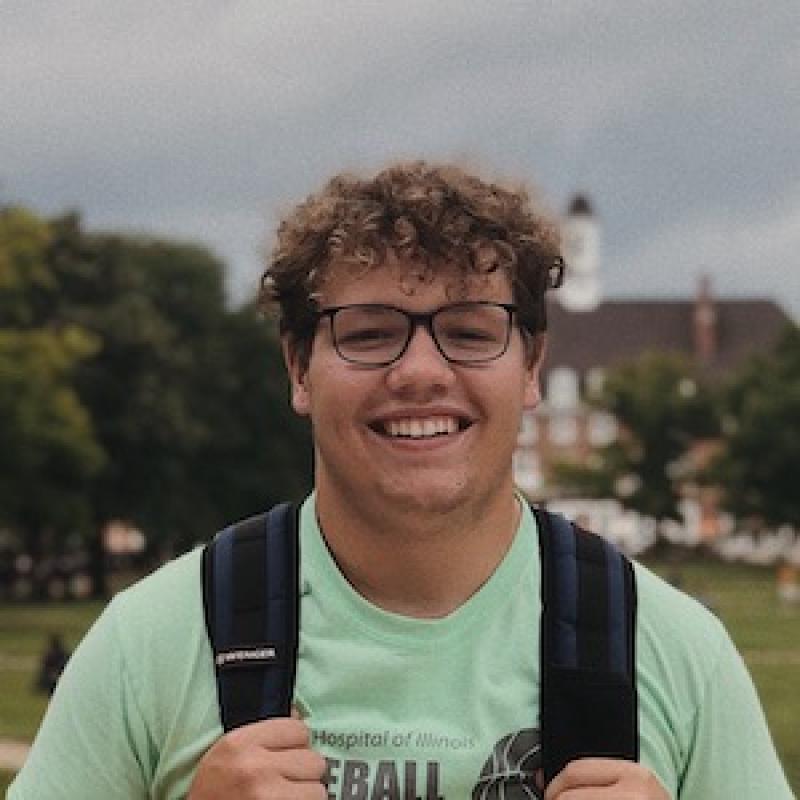
I-Health student “fell in love with health technology”
A funny thing happened to Carson Smith on his way to a career as a physician’s assistant. He “fell in love with health technology.”
Smith graduated in May with a bachelor’s degree in Interdisciplinary Health in the College of Applied Health Sciences, but notably he came to Illinois as a freshman in the inaugural class for the Students Pursuing Applications, Research and Knowledge (SPARK) program.
You could say SPARK sparked Smith’s interest in a new career.
“When I applied to the university, I was a kinesiology major. But I knew senior year of high school, after I had been admitted, that I wanted to switch to Interdisciplinary Health.
Because I wanted to be a physician's assistant,” Smith said. “When I was filling out the SPARK application, I said I was interested in health robotics. I thought robots are cool, not really knowing much about it. And then once I got in with the SPARK program and started working in the lab, I realized that I love working in the lab and doing research into assistive technologies.”
Smith said SPARK was a catalyst to get into research.
“It is a little bit difficult for freshmen to get involved in research, especially their first semester, so I knew right away that was going to be a great opportunity for me. I knew I wanted to be involved in research of some sort. It's always been a goal of mine.”
Smith got a great introduction to research as he was placed into Dr. Wendy Rogers’ Human Factors & Aging Laboratory. Rogers, a Shahid and Ann Carlson Khan Professor of Applied Health Sciences, is a renowned researcher in the areas of design for aging, technology acceptance, human-automation interaction, aging-in-place and human-robot interaction, among other areas.
Smith did not know of Rogers’ work, but quickly came to realize he wanted to learn from her.
“Once I got placed in her lab, I did some research and looked at what she was publishing and putting out there. As a freshman, I had no clue what human factors were. And now I want to make a career in working with human factors,” he said. “The SPARK program got my foot in the door.”
Smith so enjoyed working with Rogers that he applied for and was accepted into the Master of Science in Health Technology (MS-HT) program that was spearheaded by Rogers. Smith said working in the Human Factors & Aging Lab helped him “realize there's a very large need for health technology.”
“I realized that was what I really loved doing, just from really working in the lab,” he said. “It's going to really prepare me for a successful career in health technology. I'm very interested in assistive tech for older adults, aging in place. If we can keep people out of nursing homes, that's one of my biggest goals.”
That acknowledgement has led to Smith altering his future plans.
“I have changed what I want to do. I mean, in my life, I have changed it five times. But I think this one's going to stick. I no longer want to go to physician's assistant school. I decided last spring, and it was really because I had fallen in love with health technology and looking at things from a human factors perspective.”
Rogers said Smith was a "wonderful addition to our laboratory since he arrived. Initially he was on multiple projects—everyone wanted Carson on their team because he was so reliable. He found his niche on our hypertension medication management system team and has been a key player. It has been a pleasure to watch him learn and grow over the years—I know he will continue to make important contributions in the field of health technology.”
One thing that is clear is that 2022 has been very successful for Smith. In addition to completing his undergrad work and being accepted into the MS-HT program, he also earned a designation of Outstanding for his Undergrad Research Symposium presentation, entitled, ”Development and Iteration of Medication Adherence: Applications for Older Adults.”
Additionally, Smith earned a McKechnie Family Fellowship and this summer, Smith will be working at a human factors in health technology internship in Washington D.C.
Whatever lies ahead for Smith, it is certain it will involve helping people age.
“I have grandparents and great grandparents that always want to be doing things themselves. They don't want to have to ask other people to do it for them. And just growing up and seeing that, you see that people really do want to be able to take care of themselves, especially as they get older. I think that (explains) a lot of my interest in health technology.”
